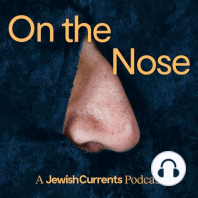56 min listen
Who Is Tom Stoppard’s “Jewish Play” For?
FromOn the Nose
ratings:
Length:
45 minutes
Released:
Dec 21, 2022
Format:
Podcast episode
Description
Tom Stoppard, perhaps the most famous living British playwright, learned only in his fifties that his mother’s family was Jewish and that nearly all her relatives were killed in the Holocaust—a fate his own immediate family narrowly escaped. Now in his eighties, Stoppard has turned these revelations into the material of his play Leopoldstadt, which tells the story of a bourgeois Viennese Jewish clan inspired by his own Czech family, and an assimilated British grandson’s discovery of their fate at the hands of the Nazis. The play, now a Broadway hit, has drawn accolades, but left several of us at and around Jewish Currents distinctly underwhelmed. Why is theater still treating the Holocaust as an object of dramatic irony? What are audiences looking for in stories of this kind? Where does Leopoldstadt fit in the long history of anti-Nazi theater, and what are its politics around Zionism? Alisa Solomon, who reviewed the play for Jewish Currents, and dramaturg Gabrielle Hoyt joined JC editors Arielle Angel and Ari Brostoff to discuss. Articles and Reports Mentioned:“Review: In Stoppard’s ‘Leopoldstadt,’ a Memorial to a Lost World,” Jesse Green, The New York Times“Attention Must Be Paid,” Alisa Solomon, Jewish Currents“Monuments to the Unthinkable,” Clint Smith in The Atlantic “Culture Under the Nazis,” Brooks Atkinson, The New York TimesThanks to Jesse Brenneman for producing and to Nathan Salsburg for the use of his song “VIII (All That Were Calculated Have Passed).”
Released:
Dec 21, 2022
Format:
Podcast episode
Titles in the series (71)
Volodymyr Zelensky and Post-Soviet Jewishness by On the Nose
